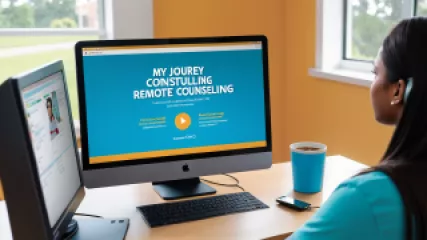My Journey with Remote Student Counseling
It was the beginning of a new school year, and I was excited to embark on my journey as a school counselor. Little did I know that this year would be unlike any other. As the COVID-19 pandemic forced schools to transition to remote learning, it also changed the way I provided support to students. This is the story of my journey with remote student counseling and how it has shaped my perspective on the importance of digital mental health support.
Adapting to Remote Counseling
When schools first closed their doors and students began learning from home, I had to quickly adapt to the new reality of remote counseling. Gone were the days of face-to-face interactions and the ability to read nonverbal cues. Instead, I found myself navigating the challenges of providing meaningful support through a screen.
One of the biggest hurdles was establishing a sense of trust and connection with my students. Building rapport is essential in counseling, and I had to find creative ways to establish that virtually. From icebreaker activities during virtual sessions to personalized emails, I aimed to create a safe space where students felt comfortable opening up about their concerns.
Another challenge was addressing the unique mental health needs that arose due to the pandemic. Students were experiencing increased levels of stress, anxiety, and isolation. As a counselor, I had to find innovative strategies to provide online mental health coaching and help students develop resilience during these trying times.
The Benefits of Online Counseling for Schools
While remote counseling presented its fair share of challenges, it also offered several unexpected benefits. One of the most significant advantages was the accessibility of online counseling for schools. Suddenly, geographical barriers were no longer a limitation, and students who may have struggled to access traditional counseling services now had the opportunity to receive support from the comfort of their homes.
Furthermore, online counseling allowed for greater flexibility in scheduling sessions. Students no longer had to miss valuable class time to attend counseling appointments. Instead, they could schedule sessions during study halls or breaks, ensuring that their academic progress was not compromised.
Remote counseling also provided students with a sense of anonymity and privacy. Some students may feel uncomfortable discussing sensitive topics face-to-face, but the digital medium allowed them to open up more freely. This increased comfort level often led to more honest and productive conversations.
The Role of Remote Academic Advising
In addition to providing mental health support, remote counseling also encompassed academic advising. As schools transitioned to virtual classrooms, students faced new challenges in staying motivated, managing their time effectively, and setting academic goals.
As a remote academic advisor, my role expanded to include helping students navigate the virtual learning environment. I offered guidance on effective study strategies, time management techniques, and ways to stay engaged in online classes. Through regular check-ins and goal-setting sessions, I aimed to empower students to take ownership of their education despite the challenging circumstances.
A Personal Connection in a Digital World
Despite the physical distance, I learned that it is possible to establish a personal connection even in a digital world. It requires creativity, empathy, and a genuine commitment to student well-being.
One of the strategies I found effective was incorporating interactive activities into our virtual sessions. From virtual scavenger hunts to mindfulness exercises, these activities helped break the monotony of screen time and fostered a sense of community among my students.
Additionally, I made it a point to celebrate student achievements and milestones, just as I would in a traditional school setting. Whether it was sending personalized congratulatory emails or organizing virtual recognition events, I wanted my students to know that their accomplishments were valued and celebrated.
Looking Towards the Future
As the world slowly recovers from the effects of the pandemic, it is clear that remote counseling and online academic advising will continue to play a significant role in supporting students' well-being. While face-to-face interactions are invaluable, digital mental health support offers a level of accessibility and flexibility that cannot be overlooked.
However, as we embrace this new era of remote student counseling, it is essential to recognize the importance of maintaining a balance. Technology should be a tool that enhances our ability to connect and support, but it should never replace the power of human connection. As school counselors, we must continue to find ways to incorporate both digital and in-person interactions to provide holistic support to our students.
In the words of Maya Angelou, "I've learned that people will forget what you said, people will forget what you did, but people will never forget how you made them feel." As a counselor, my goal is to make my students feel seen, heard, and supported, regardless of the medium through which our interactions take place.Maya Angelou
My journey with remote student counseling has been one of growth and resilience. It has taught me the importance of adapting to change, embracing technology as a tool for connection, and above all, prioritizing the well-being of my students. While the future may be uncertain, one thing remains clear: the need for digital mental health support and remote counseling is here to stay.
So, as I continue on this journey, I will remain committed to providing the best possible support to my students, whether that be through a screen or in person. Together, we can navigate these challenging times and emerge stronger on the other side.






